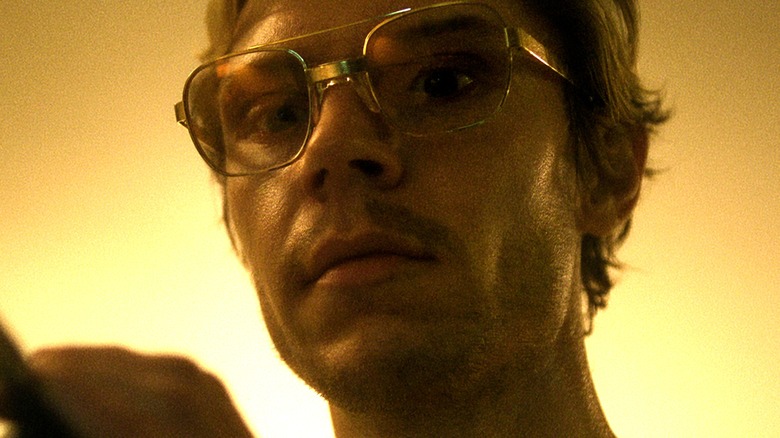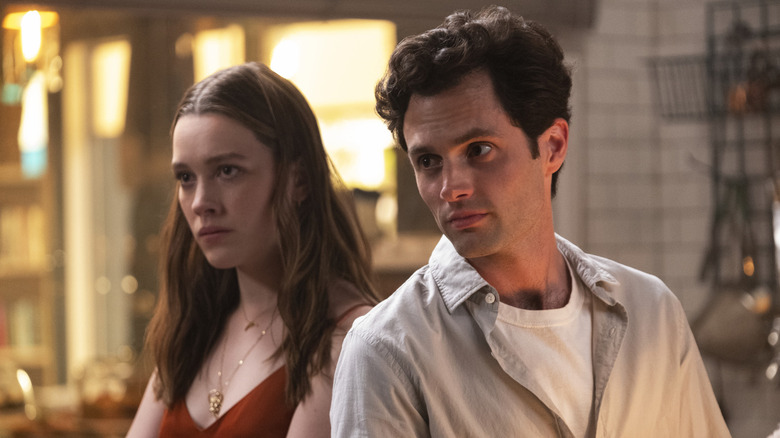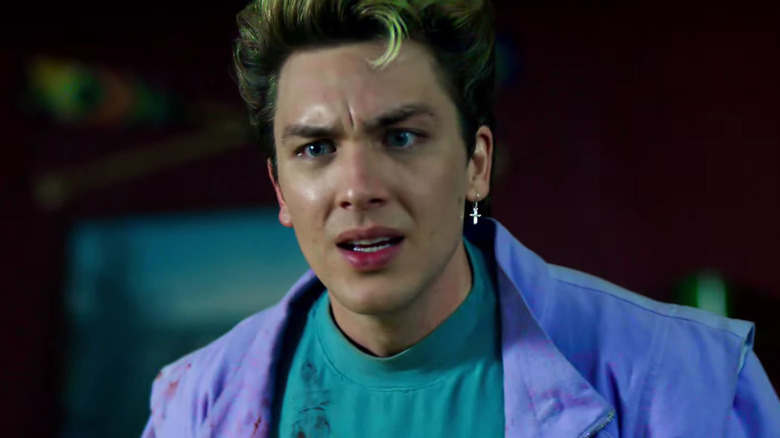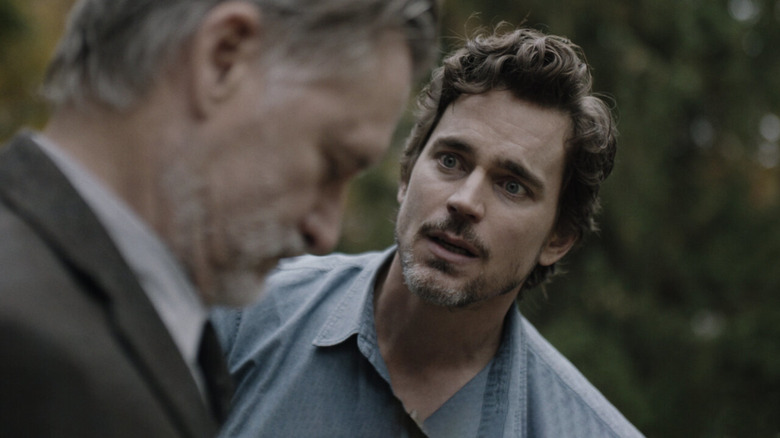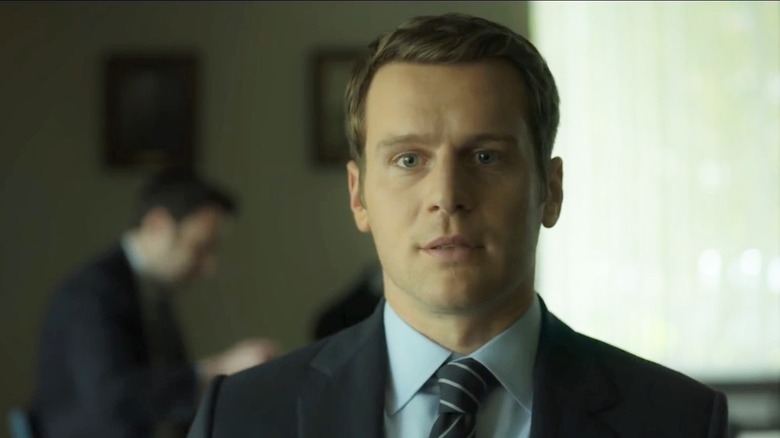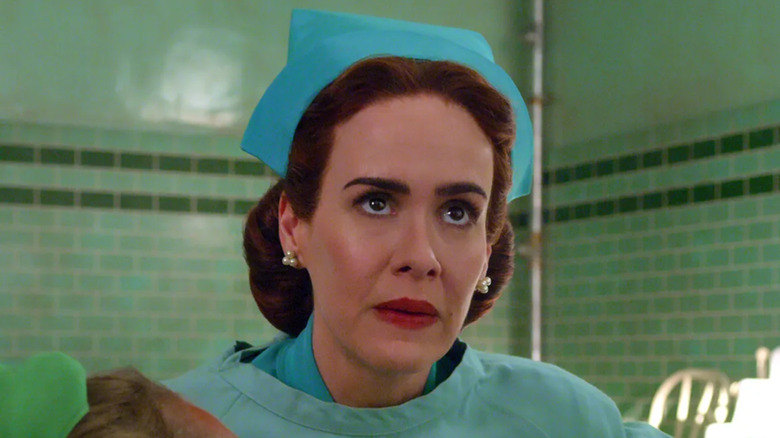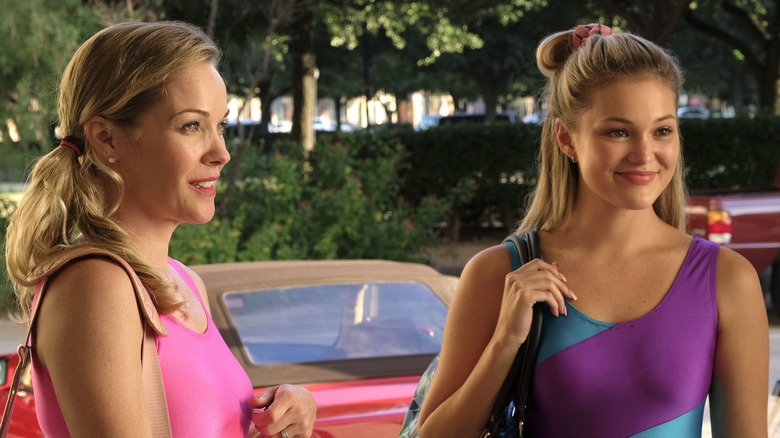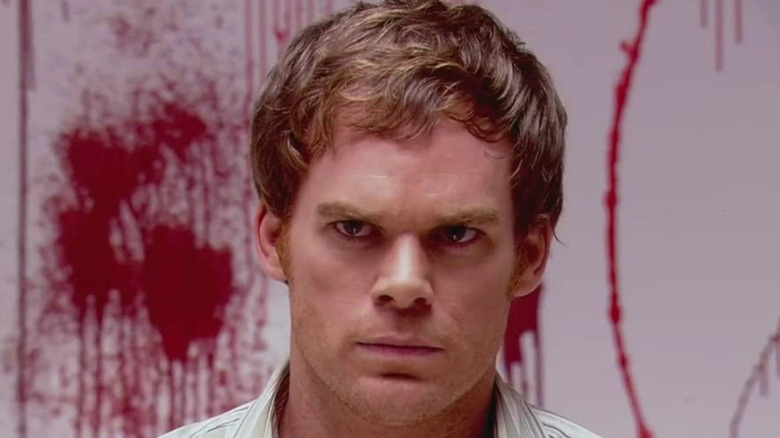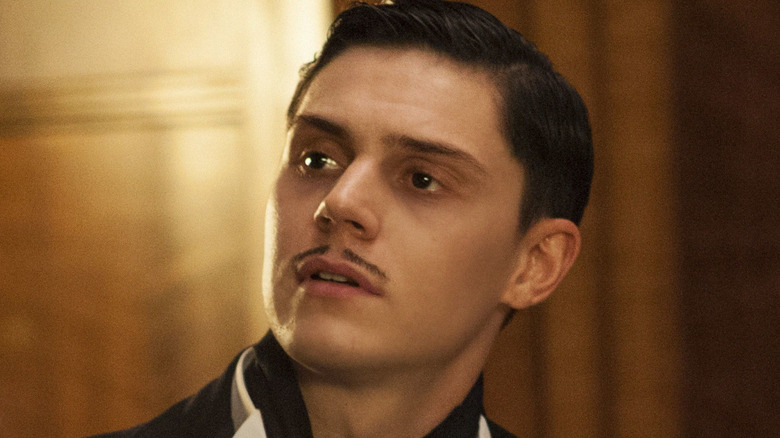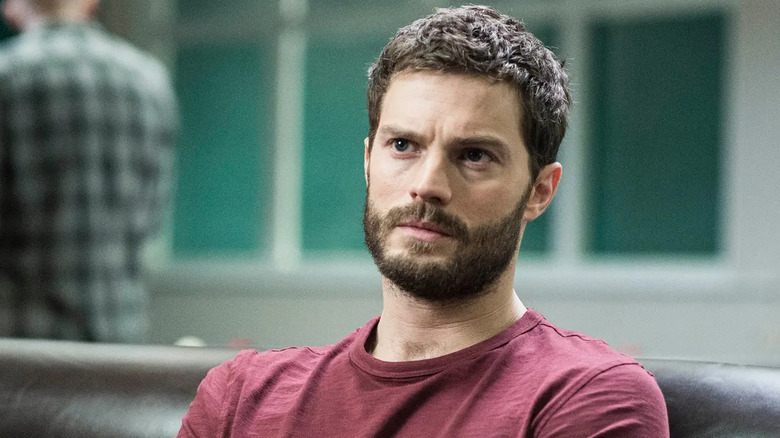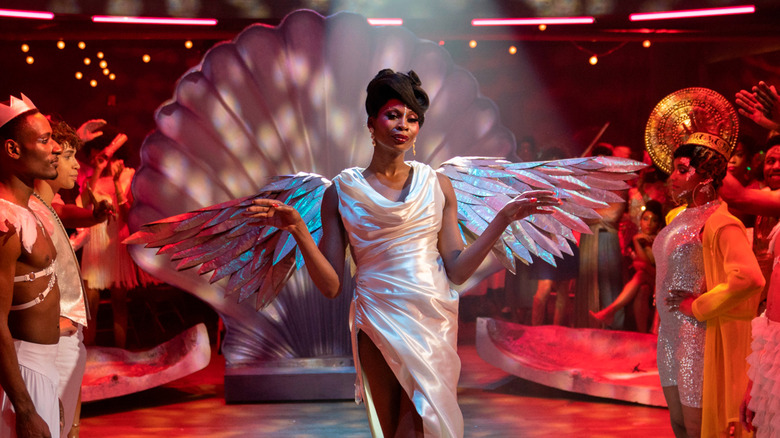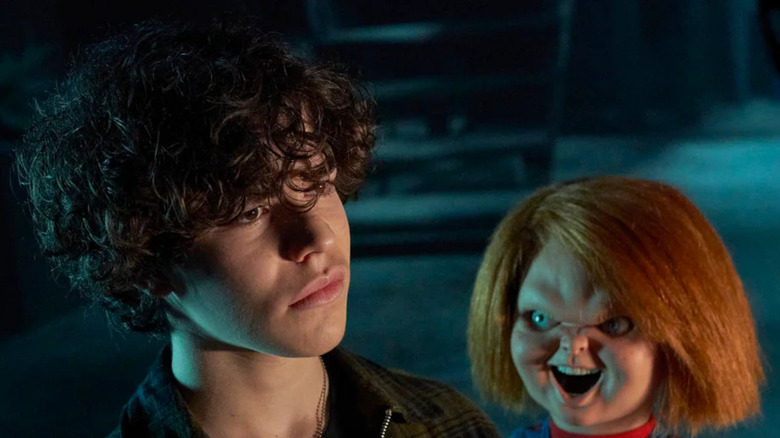12 Best Shows Like Monster: The Jeffrey Dahmer Story To Watch Next
Well, Netflix was open about the disturbing content viewers would encounter in Ryan Murphy's "Monster: The Jeffrey Dahmer Story." They told us this show would freak us out, and they were not kidding. But what's most interesting about "Dahmer" isn't the killing, or even spending time with the killer himself — it's the continuous and insistent focus on the lives Dahmer affected. Dahmer's victims, neighbors, and their families all have their turn to tell their story, sometimes even to celebrities of the day like Jesse Jackson.
For those old enough to remember the Dahmer case, it's a grisly reminder of a string of murders that ended in 1991 and terrorized the country. Younger viewers will only be familiar with the legend — if "legend" is the right word — and the horror movie aesthetic of the crimes. Both of these aspects are represented in "Dahmer" — we see not just the gritty details of life in the late '80s, but a neon-lit, feverish world of sex and death and fantasy.
If you can compartmentalize or get past the gruesome murders — which, to be fair, are never quite as lingered over as you might fear — you see a richly inventive story of one man's loneliness at war with his own twisted demons. That's the closest thing to an explanation the show can offer for what is essentially inexplicable. As with the lead in NBC's "Hannibal," one might say the cannibalism comes from a particularly oppressive kind of loneliness. It's a theory, anyway.
If you enjoyed "Dahmer" and want to know what else is out there, we've got you covered. From classic serial killers to comedic and touching updates on those themes, "Dahmer" offers at least as wide a variety of experiences as we're hoping to share with you below.
You
An interesting twist on the serial killer story since technically it's about a stalker who accidentally keeps killing people, "You" features extremely dark humor, a likeable murdering protagonist, and a fair amount of introspection about the societal and systemic ways Joe's crimes go unnoticed. As in the surprisingly progressive leaning "Dahmer," we watch a good-looking white guy get away with, literally, murder.
But it's not all preachy. More than anything else, "You" is funny. And while the humor of "Dahmer" seems to exist mostly to balance out the horrors, the humor of "You" is its main attraction, especially after the first season. Penn Badgley's raucous performance of Joe, a stalker with a head injury, is a turning point early on, and later seasons seem almost predicated on the idea of impairing Joe in similar ways as often as possible. That's not the only funny element of "You," but it's something you may not expect going in.
Seasons 2 and 3 offer up a twist, in that the predator becomes prey in a surprising way, but even that twist is secondary to the knowing, arch humor of a show that gives us the pompous monologues of an obsessive narcissist only to let the air out of his tires in ever newer and more hilarious ways. Whether it's a dark sexy thriller, a comedy of errors, or even a meditation on love itself, "You" is a raunchy pleasure.
American Horror Story: 1984
As a chronicle of Jeffrey Dahmer's life, "Dahmer" spends a lot of time in the '80s and very early '90s. "American Horror Story: 1984" — not necessarily one of the most memorable entries in the "AHS" franchise — takes place in the same era and gets the period details correct. Also like "Dahmer," it dwells on the neon-lit "gay panic" and shame of the '80s. It's hard to imagine the characters of "1984" existing in any other time period.
Ultimately, a particularly grisly ending knits the story of "1984" into classic "AHS" themes and the show's sprawling mythology. Before that occurs, a fictionalized version of serial killer Richard "Night Stalker" Ramirez takes part in "1984" in some pretty wild ways. He's first invited to track and stalk the group of virtual strangers who invade the summer camp that's central to the plot. Then he is killed multiple times, possibly possessed by Satan, possibly falls in love a couple of times, and continues murdering as a ghost. So maybe this isn't the most coherent storyline in the world, but it's all part of Ryan Murphy's fascination with serial killers that manages to pop up, in one form or another, in nearly all his series, from "Popular" to "Nip/Tuck" to the killer-centric "Hotel" and, of course, "Dahmer."
The Sinner
Each season of "The Sinner" features a different elaborate murder with an impossibly complex reasoning behind it that takes a full season to uncover. And while we never truly come to understand what's going on in Jeffrey Dahmer's head, at least we know how his story ends.
In Season 1, a woman stabs a seeming stranger to death during a beach holiday. In Season 2, A little boy poisons the couple taking him upstate — are they his parents, or is something even darker going on? In Season 3, a car accident reveals a handsome killer's hidden motives. Each season of the show is a difficult but rewarding journey, made more interesting by the fact that the show itself was only intended to be an eight-episode miniseries. The combination of tone, twists, and performances in each season leaves us wanting more, so it's easy to see why and how the show keeps reinventing itself.
In any case, the similarities here are evocative. You have two shows in which horrible acts are visited and revisited from different angles in a desperate attempt to claw together some semblance of a reason. And though "The Sinner" always makes good on that premise, the conclusions of "Monster" aren't so neat and tidy. After all, it's a real story, and real-life stories don't typically end on narratively satisfying notes.
Mindhunter
Unlocking — or, should we say, hunting — the mind of a killer is the aim of each episode of "Mindhunter," a critically beloved series that follows the FBI's Behavioral Science Unit out of Quantico.
The first season is set in the late '70s when the FBI was just starting to get into the profiling and criminal psychology game. Their first subject is the notorious "Co-Ed Killer" Edmund Kemper. The unit also meets and studies killers Montie Rissell, Richard Speck, Jerry Brudos (one of the inspirations for "The Silence of the Lambs" villain Jame Gumb), and Dennis Rader.
The second season stretches into the very early '80s, as the team investigates the string of Wayne Williams' Atlanta child murders and meets with David "Son of Sam" Berkowitz, William Pierce Jr., Elmer Wayne Henley Jr. (an accomplice in the Houston Mass Murders), and even Charles Manson himself.
The real treat here, besides David Fincher's directorial eye, is getting to spend so much time with Jonathan Groff and Anna Torv, who both turn in masterful performances in a show chock full of them.
Ratched
There is a sort of fantastical vibe in "Ratched" that might remind you of "Dahmer" in its weirdness. Another Ryan Murphy Netflix mini-series, "Ratched" contains a sympathetic lead villain, a totally amoral universe, and casual cruelty that — just as in "Dahmer" — all factor into a story of lobotomies, euthanasia, love, and danger.
Mildred Ratched blackmails her way into a sketchy mental hospital to free her serial killer brother. Along the way, Ratched gets into some classic scrapes and uncovers several festering secrets. Like Dahmer, "Ratched" makes a case for itself by sticking so strongly to her viewpoint that we're put into the position of rooting for her to get through it all.
While you don't need to see "One Flew Over the Cuckoo's Nest" to get the full effect of "Ratched," you probably should anyway. Not only is "Cuckoo's Nest" an untouchable classic, but as "Bates Motel" is to "Psycho," so is "Ratched" to "Cuckoo's Nest." The viewing experience for both shows is a little incomplete without the context of the films they're based on.
Cruel Summer
Like "Dahmer," Freeform's "Cruel Summer" features multiple timelines and a bleak point of view. But its biggest similarity with the Ryan Murphy series is its orientation toward the minor details of abuse and systemic privilege that enable so many unpunished crimes. It's officially been declared an anthology series, with subsequent seasons to follow the show's intricate but emotionally powerful structure.
Each episode alternates viewpoints between two leads and focuses on a specific day, revisiting it over three years in 1993, 1994, and 1995. The 1993 story tells the story of popular Kate Wallis, who disappears one day, and the outcast Jeanette Turner who takes over her life once she's gone. The second storyline takes place about a year later, when Kate's discovered alive and claims Jeanette knew about her abduction, with results in Jeanette becoming the most hated person in America. The final, 1995 storyline follows the messy legal fight.
It's a heart-pounding thriller like "Dahmer," and all three seasons are mortifyingly compelling for their own reasons. The abduction and grooming from 1993 are awful, the mystery of Jeanette's place in the story becomes perpetually twisty in the 1994 season, and the showdowns and drama of 1995 are top notch.
Dexter
Perhaps the original charismatic serial killer saga, "Dexter" paved the way for a lot of things to come.
In fact, it's hard to remember how revolutionary the show's original premise actually was when it debuted in 2006. Sympathetic portraits of serial killers have become closer to being the rule, rather than strictly the exception, and we have "Dexter" to thank. One might suggest this is part of a larger trend in which we reexamine our cultural fears from a subjective viewpoint. Basically, "Dexter" is charming for the same reason the vampires of "Twilight" and "True Blood" are so romantic — getting to know the killer, or the vampire or whatever it is, gives us a feeling of control over the narrative that simple incomprehensible evil never does.
Of course, "Dexter" was one half-step away from true evil since he's a serial killer of serial killers, but subsequent stories don't require such a buffer. It seems possible that pre-"Dexter," there would have been no way to even conceptualize something like "Dahmer," a narrative mainly from the viewpoint of someone we're incapable of understanding.
American Horror Story: Hotel
"Hotel" features Evan Peters as James Patrick March, a character loosely based on "America's first serial killer" H.H. Holmes, in a mustache-twirling performance that's either tremendous or laughable depending on the viewer. As is the case for so much of Ryan Murphy's work, the truth is somewhere in the middle.
But the show has deeper connections to Murphy's "Dahmer" in the way it so stridently portrays the moral bankruptcy of the Murphyverse. The majority of characters in "Hotel" – vampires, serial killers, and child kidnappers — are almost cartoonishly vile to an extent that is probably unique in his work. Even the moral deadlands of "Nip/Tuck" don't really compare to this densely packed carnival of horrors, most of them human-made.
Most of us remember "Hotel" for Lady Gaga's Countess and her vampire progeny, but the meat of the season is its several serial killer storylines. Beyond the central mystery of the Ten Commandments Killer, there's also famously a Devil's Night party that sees killer Richard Ramirez joined by Aileen Wuornos, John Wayne Gacy, Jeffrey Dahmer (here played by Murphy favorite Seth Gabel), and the Zodiac Killer.
The Fall
At least half of this classic is built out from the perspective of a serial killer and rapist as he gets in and out of scrapes. Does that sound familiar? Like "Dahmer," or its big brother "The Assassination of Gianni Versace: American Crime Story," there is no whodunit to be had — just a very clear depiction of the criminal and how he accomplishes his crimes.
In "The Fall," Gillian Anderson's Stella Gibson chases a handsome monster through the city of Belfast. Starring Jamie Dornan as the killer, his cat and mouse games with Anderson's Stella don't really feel analogous "Dahmer," but that's precisely the point of Ryan Murphy's serial killer opus. Dahmer didn't have any hardened detective with a personal stake in the case pursuing him specifically. There was no Gibson, no Somerset, no Mills, no Clarice Starling; there was just the murdering, and the cops ignoring it because they didn't care about the people being killed.
Pose
Here's another Emmy-nominated pitch-perfect period piece concerned with matters of race, sexuality, gender, and oppression. Like "Dahmer" this show can be a little hard to watch at times because the grief and pain can be so intense. But as a meditation on the tiny little evils that populate our everyday, and because it's stylized in the extreme, it's a worthy companion to "Dahmer."
"Pose" explores queer African American and Latino communities in the '80s and '90s that form under the umbrella of "ballroom culture," in which dancer-models compete for recognition in their underground culture and create their own families, known as Houses, around it. It's the perfect time period to observe matters that went largely ignored on television during the era of "Dahmer" and Pose" — the particular concerns of Black and brown communities, the drug and HIV epidemics, and societal treatment of queer people, particularly queer people of color. Rightly lauded for telling these stories and for the trans and queer bevy of writers and others behind the scenes, "Pose" is almost an answer or antidote to the anti-Blackness exposed at the heart of "Dahmer."
Chucky
Perhaps the most surprising entry on this list, the darkly absurd "Chucky" may appear from a distance to be horror-humor schlock without a thought in its head, but a few minutes of actually viewing the series will give you a different impression. "Chucky" is funny, fresh, vibrant, and moving in a way that you just can't be prepared for until you watch it. There are deaths and scares galore; some of them are pretty goofy, but that's not the focus of the show.
As in "Dahmer," the unexpected focus is on systemic brutality, young queer life, and the casual cruelties of the everyday. You may not be expecting a love story as tender as Netflix's "Heartstopper," but you'll find it here, along with winking in-jokes and callbacks to the original "Child's Play" and "Chucky" film series' tortured continuity. In fact, it's this latter strangeness, coming after at least two major reboots — all of which were accomplished by the same creator, Don Mancini — that makes the show so strangely fun.
Characters, concepts, dolls, and more — from such widely disparate films as the "Child's Play" series and the diverging "Chucky" movies themselves — come together in such an amusing hodgepodge that you never know who might show up next. But the weirdness doesn't stop there — keep an eye out for '90s heartthrob Devon Sawa as two different characters with a third set for Season 2!
The Assassination of Gianni Versace: American Crime Story
Equal parts writerly tour-de-force and character study, this brilliant jewel of a series may go down in history as one of Ryan Murphy's greatest accomplishments. In fact, it led the 70th Emmy Awards with its quantities of nominations and wins that year.
Voluptuous in its overly lush Floridian glamour and mesmerizing in its poignancy, the gore of the "Versace" spree kills is secondary to the overall emotional effect of the story, which is complex but never confusing. Told both backward and forward in time, the show starts with Versace's death and ripples back. This is the same structure used in "Dahmer," and it's even more effective here.
The show, by Murphy and English writer Tom Rob Smith, is an intricate puzzle box about queerness, celebrity, obsession, sex, violence, and pain. Episode 4 in particular stands out as a masterpiece of abject pathos and creeping horror, and worth a watch regardless of the rest of the series. (Also highly commendable: Smith's short and painful series "London Spy," which is worth watching unspoiled.)
"Dahmer" also features a career-defining role in Darren Criss' mesmerizing "Andrew Cunanan," who is every bit as much a charming trickster as he is a narcissist sociopath. Imagine "Dahmer," but the lead is actually fun to be around, and you will see the value in "Versace."
